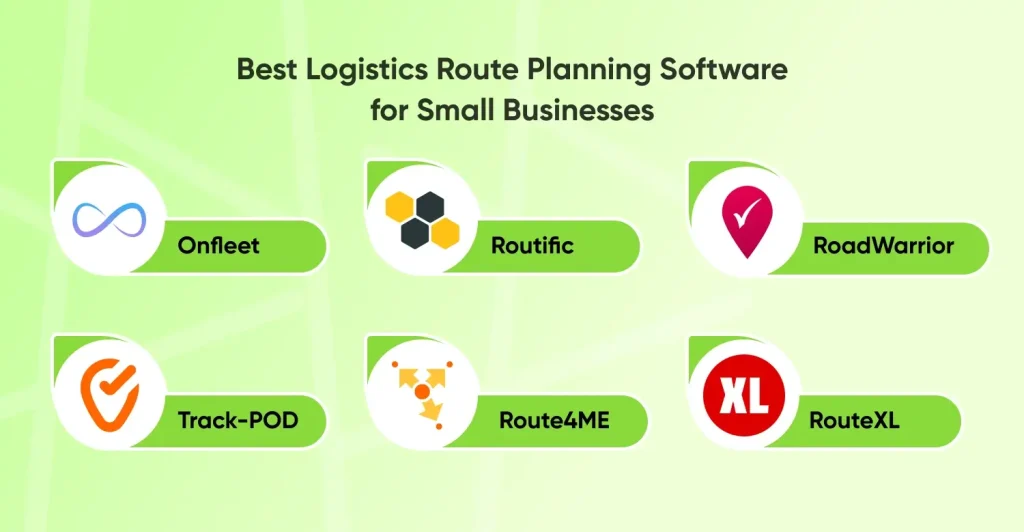Are you sick and weary of investing hours in route planning for your drivers?
Route optimization is crucial for administrators and dispatch managers to ensure their drivers follow the most effective path to their destinations. By using less fuel, it will save you money in addition to time.
Thankfully, several logistics software development services are available in the market today. You must select a route optimization system that facilitates effective route optimization, enhances team productivity and customer experience, minimizes needless delays, and allows for last-minute adjustments.
The global market for delivery route optimization software, estimated by Allied Market Research, was worth $4,325.40 million in 2020 and is expected to increase at a compound annual growth rate (CAGR) of 14.2% from 2021 to $16.3 billion by 2030.
Let’s now examine what route optimization is in detail and the reasons why a delivery service company needs route optimization software.
What is Route Optimization?
Finding the most economical path is the process of route optimization.
However, it entails more than just figuring out the quickest route between two points. Instead, it’s important to consider every aspect of the situation, including the number of stops, the kind of weather, the final destinations, and other elements like the number of turns or junctions a vehicle may come across.
What is Route Optimization Software?
With just a few clicks, dispatchers and route planners may quickly determine the optimal route thanks to the use of algorithms in route optimization software. Furthermore, most systems give users access to features and data that let them react in real time to changing conditions and modify driver routes appropriately.
This device saves a great deal of time for drivers. They won’t have to deal with the bother of circling back to places they’ve already visited or spend as much time stuck in traffic.
Logistics app development will allow you to manage the dispatchers and schedulers to determine the quickest and most efficient routes for their whole fleet while maximizing the number of stops each driver makes on a given day. In addition, these capabilities enable them to adjust the plan in the event of an unforeseen storm, traffic jam, or customer rescheduling.
Best Logistics Route Planning Software for Small Businesses

1. Onfleet
For organizations looking to boost earnings, improve customer satisfaction, and expedite last-minute delivery operations, Onfleet provides end-to-end route planning, optimization, dispatching, and communications services. Of all the applications on our list, it also features the greatest route optimization program.
To provide the quickest and most economical routes, the platform’s integrated, AI-driven route optimisation engine examines factors including capacity, location, time, traffic, and time. As conditions change, the platform automatically reoptimizes routes, and drivers receive real-time updates to their directions.
Lastly, business executives may make decisions that enhance driver efficiency and customer satisfaction thanks to the routing software’s extensive analytics and integrated mechanism for gathering consumer feedback.
| Pros | Cons |
| To help you make the best choices, the software allows you to view 90 days’ worth of historical analysis. | In comparison to other software solutions, the Onfleet capabilities are challenging to use and frequently require a significant amount of effort to fully utilize. |
| To optimize route usefulness, about 2000 picking and delivery activities are provided. | For mid-sized businesses, the cost of this route optimization technology can be prohibitive. |
| Your drivers are held accountable since they can take pictures and sign documents as evidence of delivery. | It is challenging because there is no color labeling of the routes and it just displays a collection of pins. |
| To keep them informed, customers are given live tracking links and precise estimated times of arrival. | Users find it challenging to rely on the software’s route planning because it provides erroneous results due to a lack of pertinent metrics. |
| One route can only be displayed at a time on the user interface, which interferes with visibility. |
2. Team RoadWarrior
The Team RoadWarrior fleet management system was established in 2010 and is based in the US. Small business owners, insurance agents, service providers, and couriers can all benefit from this routing software.
For teams trying to maximize routes by reducing time spent on the road, Team RoadWarrior is the finest multi-stop route planning and dispatching software. The dispatchers can design, optimize, and assign routes to delivery drivers using a web application.
Additionally, dispatchers can monitor developments and make necessary updates to delivery route plans throughout the day. On both Android and iOS mobile devices, drivers can download free route planning applications. To access transport planning without cumbersome technology, they simply need to log in using their team credentials.
| Pros | Cons |
| Accessible via Web, Cloud, SaaS, Android, iPhone, and iPad. | Not compatible with Macintosh or Windows. |
| There are features like dispatch management, area management, and live driver tracking available. | They don’t offer webinars or in-person instruction on how to use it. |
| To make wise selections, you can examine performance metrics. | lack the ability to track orders and generate invoices. |

3. Routific
A built-in route optimisation algorithm in Routific’s route planning software examines a variety of factors, including vehicle capacities, the driver shifts durations and breaks, priority clients, delivery types, ETAs, and more, to determine the best feasible routes. Features like drag-and-drop route changes, delivery analytics, proof of delivery, and live GPS monitoring are all included.
The best feasible optimized route is provided by Routific’s inbuilt route optimisation algorithm, which examines vehicle capacities, driver shifts, and turn-by-turn navigation. You may use Routific to follow drivers in real time, take pictures as evidence of delivery, and send out SMS messages to your consumers. It’s advised to look for routific options as well.
| Pros | Cons |
| Routific is renowned for providing excellent, round-the-clock customer service that is helpful to many kinds of organizations. | Customers can only communicate with help via email, which may result in lengthy wait times for assistance. |
| For simpler progress control, you will receive neatly clustered routes with real-time GPS tracking. | The Lite driver app model does not offer any live driver location-tracking functions. |
| Scheduling flexible driver breaks to accommodate for downtime is simple. | The SMS notification feature is available for an extra $19 per vehicle every month from Routific. |
| You can rapidly reassign stops between drivers with the software. |
4. Track-POD
A ready-to-use route planning tool with sophisticated Proof of Delivery capabilities is called Track-POD. It makes use of a unique route optimization algorithm designed to simultaneously optimize thousands of pickup and drop locations. Track-POD comes with all functions pre-installed, making it simple to use for any size business.
One of the three strategies-time, distance, or expense-can be used to optimize routes. You can also choose the kind of vehicle you want to optimize for with Track-POD, and you can even set route rates for predictive analytics. You also get an iOS and Android delivery driver app that is incredibly adaptable in addition to powerful route optimization tools. From safety inspections and barcode scanning to cash on delivery (COD) and personalized proof of delivery.
| Pros | Cons |
| Route planning using maps | Advanced route optimization is not covered under the standard plan. |
| Routes and orders in bulk | There are no available real-time traffic statistics. |
| Barcode scanning of an industrial calibre | |
| Verification of delivery by images, digital signatures, or PIN | |
| Route metrics for a full year |
5. Route4ME
The set of solutions offered by Route4Me includes customer communications, proof of delivery, route optimization, and route monitoring. Before handing off route optimisation to the algorithm, customers can establish predefined parameters on the platform, which supports both single and multi-driver routes. In addition, the platform gathers driver data and syncs it to a dashboard view so that users may evaluate driver performance about the estimated time of arrival and customer reviews.
Additionally, there are add-ons and customization choices available to businesses, allowing them to modify the platform to suit the requirements of their drivers, dispatchers, and clients.
Customizations are available “a la carte” through its “marketplace catalog.” This indicates that some functionality that comes standard on competing platforms is only accessible as a paid add-on with Route4Me.
| Pros | Cons |
| Users of Route4Me can import addresses by uploading Excel and CSV files. You may import hundreds of addresses with only one click. | The primary drawback of this software is that it locks users out of their accounts at random, which can be very annoying for users. |
| With real-time mileage tracking, you can keep an eye on your journeys and be informed of every detail. | It takes a lot of time because the software needs additional work to obtain accurate routes. |
| One of Route4Me’s best features is its user-friendly smartphone interface, which even non-techies can easily navigate. | You will have to pay an additional $79 a month for the software to add Windows. |
| In general, the software’s instructions are simple to follow and assist drivers in uploading media files to obtain confirmation of delivery. Id for both delivery failures and successes. |
6. RouteXL
A route planning application called RouteXL assists customers in determining the most efficient multi-stop route for deliveries, pickups, and service calls. Users can optimize itineraries with up to 20 stops using the free plan. Additionally, users can import addresses from an existing spreadsheet or enter them directly into the app. The address data will be sent, at no additional cost, to third-party geocoding providers like Mapbox, Bing, MapQuest, or Photon. However, Premium plans validate addresses using Google’s geocoding API, which is said to be more accurate than the ones we just mentioned.
In the end, RouteXL is among the better free solutions available, although it is limited to two tasks: geocoding and route optimization. This indicates that you are lacking several essential features, like a driver mobile app, real-time notifications, proof-of-delivery, and route monitoring.
| Pros | Cons |
| Users can access the software’s fundamental features and services without paying any money because the basic version is freely available. | Users may find it challenging to use RouteXL’s user interface due to its color palette. |
| A user-friendly, intuitive drag-and-drop capability in the software facilitates efficient activities such as reordering, organizing, and transferring information across different portions of the software interface. | The lack of a separate driver app in the program makes it challenging for drivers to verify and follow daily itineraries. |
| It would be easier for non-techies to utilize the software if it were more intuitive, user-friendly, and easy to use. |
What are the Benefits of Using Transportation Route Optimization Software?
Determines the Most Effective Paths
By taking into account outside variables like weather, road construction, traffic congestion, and the time of day, the appropriate software determines the trip plans that take the least amount of time. It determines the user’s most efficient path using sophisticated algorithms.
Reduces Prices
Routing software can significantly minimize travel time when utilized wisely. Thus, the cost of logistics is drastically reduced. The optimized routes resulted in two main cost savings:
Reduced Fuel Consumption
Fuel consumption is estimated to be reduced as the fleet travels less. These days, fuel expenditures make up over 30% of total costs. This implies that lower consumption results in lower costs.
Lower Maintenance Costs
Because cars are used less frequently, they experience less typical wear and tear. As a result, maintenance expenses go down.
Labour Reduction
Since fewer cars are needed, fewer drivers will be needed. Your drivers will also finish the stops faster, saving you money on labor.
Increases Output
You can delegate complicated chores to the software. Route planning won’t take up any of your time. You can use the time you’ve saved to deliver your services more effectively. Moreover, more jobs can be completed in less time thanks to optimized routes, increasing productivity. As a result, they drive less and engage in worthwhile activities for longer.
Conserves Time
Time and resources can be saved by optimizing your routes. It increases fleet productivity by making it possible for tasks to be finished more swiftly and on schedule. Deliveries made on the same day are feasible when technology is used properly.
Raises Client Contentment
Your clients would appreciate you more if you could deliver your services on schedule, of course. Software solutions for route planning make sure the correct driver arrives at the right customer at the right time without having to make a diversion. No question satisfied customers are more likely to remain clients.
Aids In Resource Reevaluation
You’re likely using more resources than are necessary to deliver goods or render services. Reevaluating the number of vehicles in the fleet with the aid of optimized fleet operations is needed.
Conclusion
The most efficient method for any organization to reduce expenses, deliver goods on schedule, and offer prompt services is to use route optimization software. Delivery fleet management systems can also assist with tracking the fleet and scheduling service calls so that they are completed on time.
Since smartphone apps and route planning systems are user-friendly and sufficient for small enterprises, most businesses are interested in utilizing them. Small businesses that merely need to optimize routes go for applications, whilst large businesses prefer to create their unique truck-routing software.
Our company develops software and apps for the web, Android, and iOS platforms. We have operations in India and the USA. Get in touch with us if you have any questions or concerns about route planning software or delivery management systems. For any kind of software, web, or app development, you can also hire dedicated developers at CAMRIX.
Simply complete the contact form found in the footer, and a member of our sales team will promptly get in touch with you to go over your needs.
Frequently Asked Questions
Can the Software Handle Multiple Stops and Complex Delivery/Pickup Schedules?
Yes, the route optimization software can manage multiple routes with the help of the multi-route feature. It helps to alter and manage delivery or pickup schedules from along the route.
Which Are the Best Route-Planning Apps?
Onfleet
Upperinc
Routific
RouteXL
Route4me
RoadWarrior
ZEO Route Planner
Roadtrippers
Is It Possible to Customize Routes Based on Specific Preferences or Constraints?
You can make a custom route constraint if the built-in ones don’t fit the needs of your application. Use the IRouteConstraint interface to construct a custom route constraint.
Can Route Optimization Be Applied to Various Industries?
In many different fields and industries, including ride-hailing, field service management, logistics, and transportation, route optimization is essential. Determining the best and most economical routes can result in substantial financial savings, shorter travel times, and higher customer satisfaction.
Is the Software Compatible with GPS and Tracking Systems?
Installing a layer of software between your scheduling and routing system and the GPS units in your cars is the integration process. To track the cars along the prearranged routes, it processes the messages obtained from the GPS units using a proprietary algorithm.







